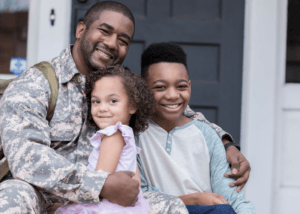The Community Collaborative Courts program (CCC) is designed to provide treatment to the most vulnerable populations in the criminal justice system. Persons accepted into the CCC include those suffering from mental illness and substance use disorder, veterans, victims of sex trafficking, and at-risk transitional age youths. Participants are charged with felony offenses or facing pending felony probation violations. For many of these persons, the CCC is the final alternative to prison.
Persons referred to the CCC are screened by the Probation Department for their suitability. The Department of Health Services will also screen referrals if mental illness is suspected.
If a person is accepted into the CCC, the person is placed on probation for three to five years and then supervised by the Probation Department for the term of probation. The CCC’s criminal justice partners will agree on a treatment program that is tailored to meet the person’s particular needs. The person’s participation in the treatment program is a condition of their probation. Programming can include residential treatment, sober living with out-patient treatment, and community after-care. For those with mental illness, the Department of Mental Health may place the person in a residential mental health program or into a Full Service Partnership if the person has out-patient status. The person may earn a dismissal under Penal Code section 1203.4 upon successful completion of the CCC.
The CCC started in December 2015. It is currently heard in four courthouses – Central, Van Nuys, Compton, and Long Beach.
SECOND CHANCE WOMEN’S RE-ENTRY COURT
 The Second Chance Women’s Re-Entry Court is an alternative sentencing program designed to provide evidence-based, gender-responsive, trauma informed, and culturally competent treatment services to women, including those with children, who are charged with felonies and facing imminent incarceration and/or prison. Treatment is designed to break the cycle of substance abuse and crime and to positively impact the children of women offenders who are at high risk of continuing the intergenerational patterns of drug abuse, criminal behaviors, and neglectful parenting.
The Second Chance Women’s Re-Entry Court is an alternative sentencing program designed to provide evidence-based, gender-responsive, trauma informed, and culturally competent treatment services to women, including those with children, who are charged with felonies and facing imminent incarceration and/or prison. Treatment is designed to break the cycle of substance abuse and crime and to positively impact the children of women offenders who are at high risk of continuing the intergenerational patterns of drug abuse, criminal behaviors, and neglectful parenting.
Participants are place on probation for three years and enrolled in an intensive six-month minimum residential program followed by up to 12 months of outpatient treatment, and then with an additional six months of after car services. Women may bring with them into the residential treatment program up to two children twelve years of age or younger. Child development specialists work directly with the children and interface with the Department of Children and Family Services regarding reunification plans, where appropriate, thereby positively impacting the next generation. Treatment is provided by the Prototypes Women’s Center in Pomona.
Participants are chosen by the criminal justice partners, including their lawyers, the District Attorney, and judge who presides over the Second Chance Women’s Re-Entry Court. The program is a specialized drug court model combining intensive supervision, mandatory drug testing, mental health treatment where needed, positive reinforcement, appropriate sanctions and court-supervised treatment to address the issues of substance use disorder, mental illness, and criminal activity. Participants who successfully complete the program and graduate can petition the court for early termination of probation and dismissal.
THE VETERANS COURT PILOT PROGRAM
 The Veterans Court is an alternative sentencing court for veterans charged with felonies or felony probation violations. The program is a multi-agency collaborative effort of the Court, Public Defender, Alternate Public Defender, District Attorney, Department of Veterans Affairs (VA) and Public Counsel. This minimum 18-month prison alternative program provides individually tailored reintegration, case management and treatment plans that promote sobriety, recovery, stability, social responsibility, family unity, self-reliance, and reduced recidivism. The Veterans Court is based on the Drug Court model, which combines intensive supervision, mandatory drug testing, positive reinforcement, appropriate sanctions and court-supervised treatment to address veteran issues. The Veterans Court accepts veterans who have served in the U.S. military, are entitled to benefits through the VA, and suffer from post-traumatic stress disorder, traumatic brain injury, substance abuse, sexual trauma and mental health issues related to their military service. Referrals to Veterans Court are made countywide by the participating agencies and privately retained defense counsel.
The Veterans Court is an alternative sentencing court for veterans charged with felonies or felony probation violations. The program is a multi-agency collaborative effort of the Court, Public Defender, Alternate Public Defender, District Attorney, Department of Veterans Affairs (VA) and Public Counsel. This minimum 18-month prison alternative program provides individually tailored reintegration, case management and treatment plans that promote sobriety, recovery, stability, social responsibility, family unity, self-reliance, and reduced recidivism. The Veterans Court is based on the Drug Court model, which combines intensive supervision, mandatory drug testing, positive reinforcement, appropriate sanctions and court-supervised treatment to address veteran issues. The Veterans Court accepts veterans who have served in the U.S. military, are entitled to benefits through the VA, and suffer from post-traumatic stress disorder, traumatic brain injury, substance abuse, sexual trauma and mental health issues related to their military service. Referrals to Veterans Court are made countywide by the participating agencies and privately retained defense counsel.
Prior to admission, the candidate is carefully screened for eligibility and suitability by the Veterans Court team and the treatment provider identified by the VA. Treatment is selected by the VA and approved by the Veterans Court judge. VA benefits cover all expenses of the selected program.
Once accepted into the Veterans Court program, the veteran is placed on probation for three to five years. The Veterans Court judge then orders the veteran to participate in the treatment program and comply with any other terms and conditions of probation which the Court imposes. The VA closely supervises the veteran and presents regular progress reports to the Veterans Court. Court appearances to monitor the Veteran’s progress are scheduled by the judge as appropriate to meet each individual veteran’s needs and ensure compliance with the goals of the program. Veterans who successfully complete the program can petition the court for early termination of probation and dismissal.
CO-OCCURRING DISORDERS COURT
![]() The Co-Occurring Disorders Court (CODC) serves individuals charged with felonies and who have co-occurring mental illness and substance use disorders. Criminal charges must involve Proposition 36 eligible charges (PC section 1210) and/or non-violent crimes. Non-violent misdemeanors are accepted if attached to a pending felony or felony probation violation. Participants must be between the ages of 26 and 59. They must have a history of homelessness, are at risk for homelessness, or reside in Department of Mental Health Service Areas 4 or 6. Persons on PRCS, mandatory supervision or parole are excluded from CODC.
The Co-Occurring Disorders Court (CODC) serves individuals charged with felonies and who have co-occurring mental illness and substance use disorders. Criminal charges must involve Proposition 36 eligible charges (PC section 1210) and/or non-violent crimes. Non-violent misdemeanors are accepted if attached to a pending felony or felony probation violation. Participants must be between the ages of 26 and 59. They must have a history of homelessness, are at risk for homelessness, or reside in Department of Mental Health Service Areas 4 or 6. Persons on PRCS, mandatory supervision or parole are excluded from CODC.
The Public Defender screens clients for legal criteria eligibility and represents approximately 90 percent of all participants, while the Department of Mental Health screens for the clinical criteria. Participants are placed in 90 days of intensive residential mental health treatment in the Antelope Valley Rehabilitation Center followed by three to six months of mental health treatment in sober living. Participants who successfully complete the program and graduate can petition the court for early termination of probation, dismissal, and expungement.
SENTENCED OFFENDER DRUG COURT
 The Sentenced Offender Drug Court (SODC) is a highly successful substance use disorder treatment program that is available as an alternative to prison. SODC is a post-conviction program designed for felony clients suffering from substance use disorder who have a sincere desire to get clean and sober.
The Sentenced Offender Drug Court (SODC) is a highly successful substance use disorder treatment program that is available as an alternative to prison. SODC is a post-conviction program designed for felony clients suffering from substance use disorder who have a sincere desire to get clean and sober.
Once accepted into SODC, the participant is placed on probation for three to five years. Treatment begins with placement in a county jail treatment pod for 104 days.
The participant is then placed in either residential treatment or sober living for 60 days followed by out-patient treatment. Upon the completion of SODC, the participant will earn a charge reduction and/or dismissal.
OFFICE OF DIVERSION AND RE-ENTRY
![]() The Office of Diversion and Reentry (ODR) launched the Permanent Supportive Housing Pilot Project on August 1, 2016, in collaboration with the Criminal Division of the Superior Court, Public Defender, Alternate Public Defender, and District Attorney. This program seeks to serve persons who are homeless and suffering from either mental illness and/or substance use disorder. Clients accepted into ODR are provided permanent housing and treatment for their mental health and/or substance use disorder.
The Office of Diversion and Reentry (ODR) launched the Permanent Supportive Housing Pilot Project on August 1, 2016, in collaboration with the Criminal Division of the Superior Court, Public Defender, Alternate Public Defender, and District Attorney. This program seeks to serve persons who are homeless and suffering from either mental illness and/or substance use disorder. Clients accepted into ODR are provided permanent housing and treatment for their mental health and/or substance use disorder.
The ODR Permanent Supportive Housing Pilot Project is heard in Department 44 at the Clara Shortridge Foltz Criminal Justice Center (CSFCJC) and in Department 3 at the Compton Courthouse. These courts will accept from their respective jurisdictions felony cases and misdemeanor cases attached to a felony matter.
Lawyers may make referrals to the Permanent Supportive Housing Pilot by contacting ODR at lacountydiversion.org/referral. For cases that were not filed at the CSFJCJ or the Compton Courthouse, lawyers should contact the Public Defender Offices at the aforementioned locations before making a referral to ODR.


